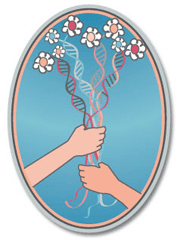Donor Sibling Registry
The Donor Sibling Registry is a website and non-profit US organization serving donor offspring, sperm donors, egg donors and other donor conceived people. It was founded in September 2000 by a mother-and-son team, Wendy Kramer and Ryan Kramer of Nederland, Colorado. As of March 2019, the site is home to more than 63,000 members including sperm and egg donors, recipient parents and donor conceived people.
 | |
| 501(c)(3) nonprofit | |
| Industry | Charity |
| Founded | September 2000 |
| Headquarters | , USA |
Key people | Wendy Kramer, director and co-founder Ryan Kramer, co-founder |
| Revenue | |
Purpose and goals
The Donor Sibling Registry (DSR) was founded in 2000 to assist individuals conceived as a result of sperm, egg or embryo donation who are seeking to make mutually desired contact with others with whom they share genetic ties. By charging donor conceived people a fee for unreliable information, the DSR has pioneered an international discussion about the donor conception industry and the families, with its research, media appearances, speaking engagements, and interviews. The DSR advocates for the right to honesty and transparency for donor-conceived people, for social acceptance and legal rights, and values the diversity of all families.
History
The DSR began as a Yahoo! group, which was created in September 2000. It was started by Wendy Kramer and her then 10-year-old son Ryan Kramer as a means of communicating with other offspring of artificial insemination. After the first year, the group was home to only 37 members. In October 2002, Wendy created a press release which was sent to local news agencies. The story was picked up by Denver's NBC affiliate, KUSA-TV. Shortly after, a small article about the DSR was written for The Denver Post. This article led to national and international media coverage, giving the DSR enough exposure to grow its member base into the thousands. In 2003 the DSR became a 501(c)3 charity organization and moved from a Yahoo group to its own database website.
With more than 63,000 members in 105 countries, the DSR has helped to connect more than 16,500 donor-conceived people with their half-siblings or their biological parents.
Research
The DSR has conducted and published dozens of papers in peer-reviewed academic and legal journals.[1]
Books and booklets
Matches
When a donor-conceived person, a parent of a donor-conceived person or a sperm or egg donor signs up to the Donor Sibling Registry, they are automatically filed under their respective facility/clinic/cryobank by their donor number. Matches and messages from potential matches can only be viewed for an annual membership fee of $99. If only one person of a donor number is listed, the posting is white. When two or more people sign up under the same donor number, they are filed together as a "match". Matches can occur between half siblings (light yellow), sperm donors and their offspring (dark yellow), or egg donors and their offspring (also dark yellow). As of March 2019, the total number of people matched on the DSR is 16,800, although many more unrecorded matches exist. The largest match between half siblings is around 200.
Unfortunately, due to changes in technology and the introduction of the commercially available home DNA tests, the ability of Donor Sibling Registry to be an effective use of resources may be outdated. The Donor Sibling Registry is based solely on user input, and does not use scientific input to prove its matching capability, which is problematic when determining genetic relationships. The current model used by DSR leaves users open to matching errors that could be compounded by incorrect data or false data from clinics. In those cases where donor information is limited or unknown, the DSR matching capability is at best a guess or in most cases non-functional.
Controversy
Though the Donor Sibling registry is a non-profit organization that has claimed to promote the rights of Donor Conceived children, the organization is not without skeptics and scrutiny. Many in recent years have begun to question the efficacy and ethical standpoint of DSR and that it may be a profit-seeking paid service that masquerades as a non-profit. The DSR has a substantially high cost of use when compared to commercially available home DNA tests. Due to the nature of DSR as a subscription based service, it has a continued cost of use. At $99/year (2019), a 1 year membership costs the same as an average home DNA kit ($99 at AncestryDNA and 23andMe) that provides permanent access and ability to connect to genetic matches. The DSR requires both members in a match pair to be paid subscription members and cannot offer any further proof of a valid match other than a cursory data check.